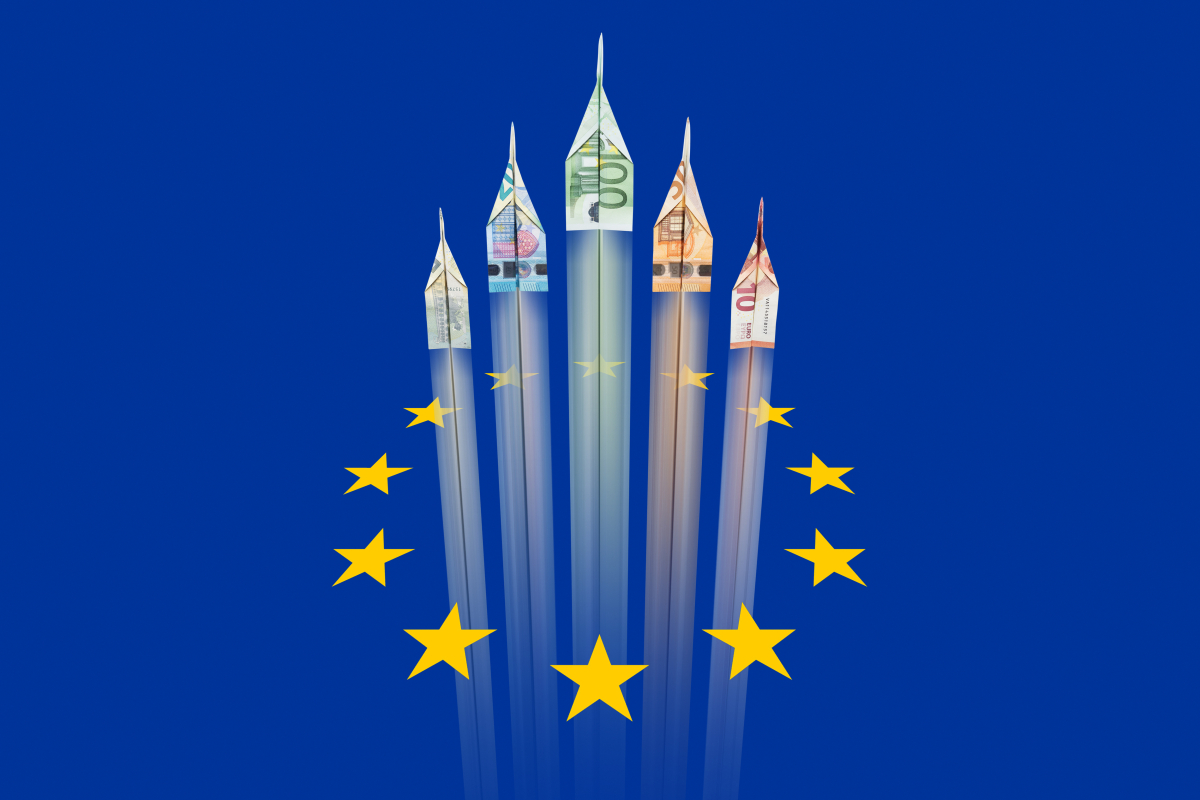United we scale

For decades, Europe has fostered global champions – companies born and scaled within its borders, shaping industries and projecting influence worldwide. The German economy is heavily reliant on exporting cars, machines, and other goods into the world. We've excelled at invention, nurturing world-class universities and seeding innovative startups across diverse sectors. Yet, the “European Dream” has remained elusive. While ideas blossom here, the immense value they create frequently gets captured elsewhere. Europe doesn't have a startup problem; it has a persistent scaleup problem.
The statistics paint a stark picture. As of late 2023, the US created roughly eight times more billion-dollar unicorns than the entire EU, with China hosting three times as many. Europe accounts for only 14 percent of the world’s unicorns and attracts only 5 percent of global venture capital, compared to over 50 percent flowing into the US. These aren’t just numbers – they represent countless European innovations that never reached their potential.
Now, facing geopolitical tensions and questions about its global competitiveness, Europe is at a crossroads. Overcoming the scaleup gap requires more than incremental change; it demands a systemic shift in how we approach market unity, capital allocation, and the crucial battle for talent. The new “EU Startup and Scaleup Strategy” aims to tackle these deep-rooted issues, but will it be enough to reignite the dream?
The promise of a unified market
One of the most significant barriers facing European entrepreneurs is the very market they operate in. A startup successfully penetrating its home market (Germany, for instance) still faces a labyrinth of 27 distinct legal, tax, and administrative systems when, for example, expanding into France, Italy, or Poland. This fragmented reality drains resources, slows growth, and makes scaling across the continent a costly, complex endeavor compared to the unified markets of the US or China.
Addressing this head-on is perhaps the most ambitious part of the new EU initiative: the proposed EU Inc., a pan-European legal entity or “28th regime.” Imagine a single framework – one set of corporate, labor, and tax principles – allowing innovative companies to incorporate once and operate seamlessly across the EU’s market of 450 million consumers. As European Commission President Ursula von der Leyen stated at the World Economic Forum this year, this envisions a future where innovators can “operate all across our European Union under one single set of rules.” If implemented effectively, this “Delaware of Europe” could slash the red tape that forces founders to treat the EU as a patchwork rather than the powerful single market it should be. By harmonizing rules on key issues such as employee stock options and simplifying public procurement processes, the initiative demonstrates an awareness of the practical challenges that founders face.
Bridging the investment gap
Beyond market access, however, lies another critical gap: capital. While early-stage funding has improved, European scaleups consistently struggle to secure the large, late-stage investment rounds (Series B, C, and beyond) available in Silicon Valley or Asia. That 5 percent share of global VC funding tells the story – European founders often find themselves hitting a financial ceiling at home.
Founders don't relocate solely because of bureaucracy; they often leave because a US investor offers capital – tens or hundreds of millions – that European funds struggle to match at that crucial growth stage. The EU acknowledges this, hinting at a “Savings and Investments Union” to unlock more homegrown financing. This shift in capital allocation is critical. Europe must mobilize its substantial institutional funds – directing pension funds, insurers, and family offices toward greater investment in venture capital and growth equity. The cultural shift towards embracing higher-risk, high-reward tech investment needs active encouragement and potentially new mechanisms, ensuring European scaleups can access fuel for global expansion without needing a transatlantic flight.
Competing for global talent
Europe possesses extraordinary human capital – brilliant engineers, scientists, and creatives. But in the global race for innovation, simply having talent isn’t enough. We need to position Europe as the premier destination for top global talent, especially experienced leaders who understand how to manage rapid growth phases. This goes beyond mere skills; it touches upon culture and mindset, areas where Europe has sometimes lagged, historically being less forgiving of failure than Silicon Valley.
While harmonizing stock options and streamlining visa processes are necessary technical steps, winning the talent war requires something more profound: a compelling narrative. Positioning Europe as the place where exceptional talent builds meaningful futures demands a powerful story about why innovating here matters.
Creating this compelling narrative presents a uniquely European challenge. While the American Dream offers a relatively cohesive vision despite regional differences, Europe comprises 27 nations with distinct cultures, languages, and identities. Rather than a singular European Dream, we have a rich tapestry of national and regional aspirations that must find common ground.
This diversity makes crafting a unified message difficult. Unlike Hollywood, which broadcasts the American Dream worldwide, Europe lacks a single cultural ambassador for innovation. Instead, our appeal for the 21st-century innovator must draw on shared values that transcend national borders: a commitment to human rights, sustainability, collaborative and innovative solutions to global challenges.
By framing our diversity as an asset rather than an obstacle, and nurturing an environment that genuinely celebrates entrepreneurial ambition, Europe can offer a compelling value proposition. This vision can both attract global talent and foster a sense of belonging and shared purpose, convincing innovators to stay and build Europe’s future.
From ambition to action
It’s encouraging to see Brussels prioritize scaleups. However, I can’t help but feel a sense of déjà vu. The 2016 Startup and Scaleup Initiative yielded modest results. Will this time be different?
One reason this time might be different is the current geopolitical awareness and political and public pressure. It creates a unique window of opportunity.
The bold EU Inc. proposal faces a lengthy and uncertain legislative journey, requiring unanimous Member State approval – something historically difficult to achieve for such unifying measures. Optimists predict a two-year timeline; pessimists fear longer delays or fatal compromises. In the fast-moving tech world, two years are an eternity. Europe’s most promising scaleups won’t wait; the pull of deeper capital markets and unified ecosystems elsewhere remains strong. There’s a real danger that slow execution or watered-down agreements could render this initiative toothless. Moreover, addressing market fragmentation and talent policies without decisively tackling the late-stage funding gap risks solving only part of the equation. This initiative demands “wartime urgency” from policymakers.
The path forward
Europe stands at a pivotal moment. The ambition to reclaim its place as a hub for global technology champions – the European Dream – is noticeable. The EU Startup and Scaleup Strategy and the EU Inc. concept offer a pathway to tackling the long-standing issue of market fragmentation.
However, this must be the starting point, not the entire race. Realizing Europe’s scaleup potential requires an urgent effort on multiple fronts. We must deliver the promise of a truly unified market with speed. We absolutely must unlock significant European and domestic capital for growth-stage companies. And we need to craft and project a powerful narrative that attracts and retains the world’s best entrepreneurial minds by highlighting Europe’s unique strengths and purpose.
In a way, Europe itself needs to act more like a startup: embracing a bold vision, pivoting from past approaches, and executing with agility. However, success hinges on the collective will of policymakers, investors, corporations, universities, and the startup ecosystem to move beyond rhetoric and implement bold, complementary actions.
Europe must claim its position as a global leader and pioneer in technology and innovation, but also as a champion of the free world. The window of opportunity is open. If we don’t act decisively now, we may never get another chance.
This article was first published in the ESMT Update Summer 2025.
ESMT Update Summer 2025

ESMT Update 06/25
Interested in thought leadership or news by ESMT?
